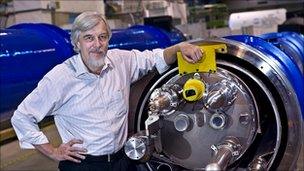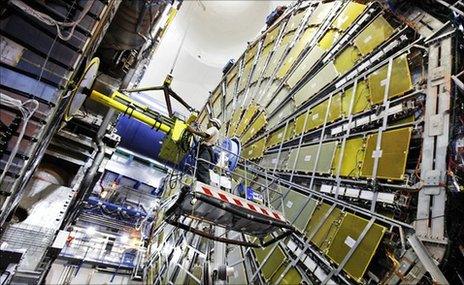Q&A: Rolf Heuer, director-general, Cern
- Published
The race to detect the "God Particle" is heating up. A US "atom smasher" called the Tevatron may have its life extended to continue searching for the Higgs boson.
Rolf-Dieter Heuer is director-general of Cern (The European Organization for Nuclear Research), which operates the Large Hadron Collider - the major European rival to the Tevatron.
In an interview with the BBC's Paul Rincon, Dr Heuer said he hoped that Europe would be first to detect the Higgs particle.

Rolf Heuer hopes the LHC could turn up new physics during its first run
PR: You must be excited by the possible detection of the top quark - the most massive elementary particle - by the Large Hadron Collider (LHC). Does this bode well for the early discovery of new physics by the LHC?
RH: Yes. I think it's amazing how well the experiments were prepared, and how well they were calibrated. Everything is running fantastically; the machine, the experiments and also the computing grid, which is very important to distribute and analyse data worldwide.
So, it is going fantastically well after four months; now it's up to nature to give us new physics.
PR: Do you think new physics - signs of supersymmetry perhaps, or signs of the Higgs boson - could be detected within the LHC's first science run?
RH: With supersymmetry I think there is a chance because we can open a much larger window [the LHC can get up to much larger energies than any previous particle smasher] than our friendly competitor the Tevatron at Fermilab [the US national laboratory which operates the Tevatron].
If there are low-mass states, up to 800 gigaelectronvolts (GeV), we have discovery potential [for supersymmetry] at the LHC until the end of next year. With the Higgs, it might take more time because the Higgs is a very elusive particle, very difficult to find. I guess it will take longer.
PR: Does the fact that the Tevatron may now work until 2014, through the time when the LHC is shut down [for maintenance at the end of 2011], give Fermilab a potential advantage for finding the Higgs first?
RH: They would not run it [until then] if they did not see an advantage in that. We have to [investigate] and see what they could gain from running for three more years.
It could give them an advantage, but I think we have to prepare the LHC in such a way that it safely runs at high energies and (achieve that) as early as is possible.

Atlas is one of the LHC's two "multi-purpose" experiments
As a physicist, I must say in principle it doesn't matter where the particle is found, the main thing is that it is found. As the D-G of Cern, I must say I would of course like to find it first, that's clear. But it's science that counts and we are now carefully looking into our plans.
PR: What can we draw from the combined result of recent Higgs searches at the Tevatron and, if the Higgs is this elusive, what happens if we don't find it? What then?
RH: The (combined Tevatron) results... exclude a mass region where the [Higgs] particle is, let's say, easiest to find. The closer you go to the lower limit... the more difficult it becomes. So it doesn't change the possibilities for Fermilab or for Cern.
At the moment, I don't know how to define when we should say that we have not found it. With 95% probability of exclusion, we still have 5% probability we could find it. So that takes some time.
I think we can define when we have not found it when we have found something else. If the Higgs boson is not there, there must be something else which is fulfilling the same tasks. Something must happen at the energy range of the LHC in order to give mass to particles.
PR: The LHC could start the search for dark matter particles soon. Does this search have the potential to turn up something quite quickly, or do you see that as a longer-term endeavour?
RH: Both. For example, with supersymmetric particles, we have discovery potential of more than a factor of two above the Tevatron in 2010/2011. If nature is kind to us, there could be dark matter candidates of reasonably low mass - below 800 GeV.
If nature has decided to put dark matter candidates into the higher mass region, beyond 800 GeV, it will take more time - as for the Higgs boson. This is the nice thing: you don't know when you will find it, and you don't know what you will find - you just know what you are looking for.
PR: The penultimate question. The Super LHC (a proposed upgrade to boost the luminosity - or beam intensity - of the LHC): what will that allow you to do and are you confident you will secure the funds to do that?
RH: We have changed the way we are planning to do the high luminosity phase of the LHC so that we can afford it - even in the present circumstances. It will give us a higher chance of finding things which have an even lower probability of being produced.
So we can dig even deeper into the haystack; that's one thing. Then, by increasing the amount of collisions, you will also go deeper into the tail of the energy distribution. You automatically get 10-15% higher energy reach than before.
PR: With the next generation of particle colliders, such as the Compact Linear Collider (CLIC) and the International Linear Collider (ILC), is there any broad timescale and are you confident you will get the money? Also, how would these projects be governed?
RH: They have to wait for the results from the LHC, because one technology is essentially ripe (the ILC) but it does not give as much energy as the other technology (CLIC) which is not as ripe.
The governance of such projects needs to be global. We have to discuss how to involve everybody in the design, construction, maintenance and operation of such a facility. So discussions are going on over how to do that.
I think it is affordable if the three regions of the world are working together. This is what they started to do at the LHC. Now they have to do it at a different scale for the ILC or CLIC.
Rolf-Dieter Heuer was speaking to BBC News at the recent International Conference on High Energy Physics (ICHEP) in Paris
- Published23 July 2010
- Published22 July 2010